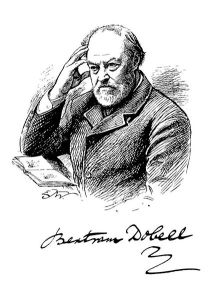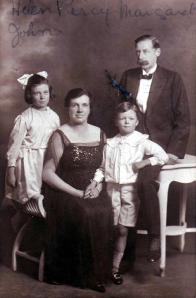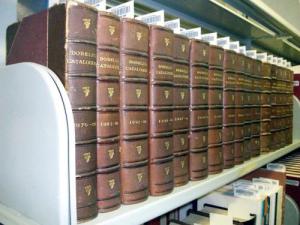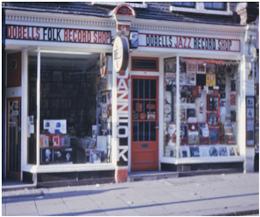Percy John Dobell served as president of the International Association of Antiquarian Booksellers (as the ABA was then called) in 1922. Born at Kentish Town in North London in the latter part of 1871, he was the second son of Bertram Dobell (1842-1914), at that time a twenty-nine year old newsagent and tobacconist on bustling Queen’s Crescent, and his wife Eleanor Wymer (1847-1910), twenty-three year old daughter of a Norfolk timber-merchant. The couple had married in 1869. Bertram Dobell’s disabled father, a tailor by trade, his mother and a younger brother also lived on the premises.
Starting out in life as a grocer’s errand-boy, later a porter, brought up in poverty, without much education, Bertram Dobell used his newsagent’s shop (opened in 1868) as a platform to start a book business that was to become one of the most famous in the world. Issuing his first catalogue in 1876, he was the first bookseller to find premises on the Charing Cross Road, opening a shop at No. 54 in the newly built and just opened street in 1887. A second shop at No. 77 followed in 1894. His life story, the rediscovery of Thomas Traherne, the rescuing of James Thomson, his own reputation as a poet, etc., has often been rehearsed. The easiest point of reference is the biography (compiled by his great-grandson, Anthony Rota) in the Oxford Dictionary of National Biography, but he was memorialised even in his own lifetime in Samuel Bradbury’s 32-page tribute, “Bertram Dobell : Bookseller and Man of Letters” (1909). Arthur Quiller-Couch noted that, “He is at pains to make his second-hand catalogues better reading than half the new books printed, and they cost us nothing”. On his death in 1914, the New York Times blazoned the story under a quadruple-tiered headline, the first element loudly proclaiming, “DOBELL, FAMOUS BOOKSELLER, DEAD”.
So famous was he, I imagine Percy Dobell must have found it difficult to emerge from that paternal shadow, but, having produced his own six-page “In Memoriam” (1915) on his father’s life and career, he became both a major bookseller and a “real scholar” (to quote Anthony Rota) in his own right.
On the death of his father, the business had passed to him and his younger brother Arthur Eustace Dobell (1882-1956) – in fact born Eustace Arthur Dobell, but the forenames always inverted other than on official documents. Both had long worked for their father: Percy Dobell had been a familiar figure in the auction rooms in his own right since the Ashburnham sale in 1897. The firm simply carried on as “P. J. & A. E. Dobell”, continuing for very many years to add “Sons of the late Bertram Dobell” to their letterhead. Percy was evidently always the senior figure and looked after the original shop at 54 Charing Cross Road, mainly specialising in 17th and 18th-century English literature, or as his father had put it in verse:
“Old plays are there, old poems, old romances.
Things that the busy world has long forgot;
Books full of strange and undigested fancies,
By brains half mad and half inspired begot”.
Meanwhile, Arthur looked after No. 77, with a stock of modern first editions and all the other “miscellaneous”. Percy was immediately recruited to the ABA Committee in place of his father, who had served on it since the ABA was founded (as The Secondhand Booksellers’ Association) in 1906. He was to serve on the Committee for over thirty years.
Already in his forties, Percy Dobell was also now a family man. A painfully short first marriage to Emma Curtis Browne in 1903 had ended with her early and untimely death in 1905. In 1909 he married Helen Jane Wright (1886-1961), the privately educated daughter of a Norfolk farmer. A daughter, Margaret Eleanor Dobell (1910-1985), and a son, Robert John Dobell (1913-1972), soon followed. The family lived initially at 13 Torrington Park, North Finchley, subsequently at 1 Branch Hill Side, Hampstead, and then (from 1921) at The Hermitage, Windsor Terrace, Belsize Park. Their final London home was a 2 Ornan Mansions, Haverstock Hill.
Business continued. The Western Daily Press of Saturday 10th June 1916 reported the sale of a “remarkable collection of English historical broadsides and proclamations printed between 1626 and 1700” – some 800 items in all – while in April 1918 the Aberdeen Journal, after bemoaning the wartime paper shortages that were interfering with the production of booksellers’ catalogues, noted that “A new catalogue is being eagerly awaited from Mr Percy Dobell, the son of the late Bertram Dobell, to whom innumerable book-lovers were debtors, who has nearly ready a catalogue of ‘The Literature of the Restoration’, embracing poetical and dramatic works produced between 1660 and 1700, with particular reference to the writings of Dryden. Mr Dobell has given considerable space to the work of, among others, Mrs Behn, Congreve, Lee, Otway, Villiers Duke of Buckingham, and Wilmot Earl of Rochester, but it is his presentment of the minor writers, practically unknown even to diligent students of our poetical literature, that constitutes the value of the forthcoming catalogue”.
This was followed by “Books of the Time of the Restoration” (1920) and that particular field was becoming Percy Dobell’s own. His publication of “John Dryden : Bibliographical Memoranda” (1922) fully established his authority, an authority which soon extended to the eighteenth century as well, with, for instance, the magisterial “A Catalogue of XVIIIth Century Verse and a Catalogue of Books by and relating to Dr. Jonathan Swift” (1933).
Dobell’s reputation has suffered somewhat from the discovery of his meticulously marked-up catalogue (together with his slightly earlier diary or day-book) which paved the way for Arthur and Janet Ing Freeman to unravel exactly what happened at the infamous Ruxley Lodge auction in 1919 (“Anatomy of an Auction”, 1990). This has led some to suppose that he was some sort of criminal mastermind who engineered the whole conspiracy, but not so – the practice of ringing auctions was endemic, not illegal at that time, and he was no more culpable than any of the other (at least eighty) booksellers who took part. That said, he appears, having given the auctioneers not a penny – and indeed having spent just £125 on books – to have pocketed something approaching £500 (five times the annual salary of his chief assistant at this time) in dividends from the four rounds of post-sale knock-outs he attended. This may not have endeared him to his colleagues. He was evidently a cautious man, or perhaps “habitually parsimonious” as the Freemans allege.
He was certainly much closer to the side of the angels when, as Percy Muir recorded, he was one of the company at the first dinner of that informal group which became known as the ‘biblio boys’. This was the group, led by John Carter and Graham Pollard, which was to go on to unmask the Thomas Wise forgeries. Interestingly, he was the only senior member of the trade establishment present. He must have held the respect and trust of this much younger generation of booksellers, most at least thirty years younger than himself, and men from a rather different mould.
 The premises at 54 Charing Cross Road had been abandoned for larger ones at 8 Bruton Street in 1921. As Dobell’s son noted in this letter (supplied by the inestimable Richard Ford from his wonderful stock of such things) to John Sparrow, “There was no inner sanctum and my father was always easily approached but, as you may agree, the whole shop was a ‘sanctum’ in the sense that it was filled with the atmosphere arising from the taste, knowledge and personal qualities of the owner”.
The premises at 54 Charing Cross Road had been abandoned for larger ones at 8 Bruton Street in 1921. As Dobell’s son noted in this letter (supplied by the inestimable Richard Ford from his wonderful stock of such things) to John Sparrow, “There was no inner sanctum and my father was always easily approached but, as you may agree, the whole shop was a ‘sanctum’ in the sense that it was filled with the atmosphere arising from the taste, knowledge and personal qualities of the owner”.
The family opened a third shop in 1923. The brothers’ sister Evelyn Jane Dobell (1874-1953) had married Carlo Rota (1872-1941 – his forename also given as Carolo or Charles on various occasions), a meticulous proof-reader, in 1901. Their son Cyril Bertram Rota (1903-1966 – father of Anthony, grandfather of Julian), having learnt his trade under his uncles since 1918, was ready to set up on his own – and brought into being one of the most famous of all dynasties dealing in modern first editions.
In 1934, Percy Dobell removed his portion of the business to seclusion of Tunbridge Wells. A reporter for the Kent & Sussex Courier (Friday 28 July 1939), apparently picking up on something which had earlier appeared in the Evening Standard, paints a picture of him there: “l learn that Mr. Percy J. Dobell of 24, Mount Ephraim, Tunbridge Wells, the 17th century book expert, has sold his private collection of works and relating to John Dryden, the finest this country, to an American university … It is not often that booksellers have either the time or the means to form private collections. Mr. Dobell is the rare exception … Mr. Dobell was for many years in business in Bruton Street, a timid, bent, grizzled figure, concealed behind an untidy pile of rare books and pamphlets in a dark, back room. He moved a few years ago to the relative seclusion of Tunbridge Wells, where he is training his son to succeed him the business”.
The “P. J. and A. E. Dobell” partnership was formally brought to an end on 31st December 1945, the Tunbridge Wells part of the enterprise becoming “Percy J. Dobell & Son”, with Robert Dobell becoming a full partner in 1949. After his father’s death on 23rd January 1956, his son issued a short tribute, “Percy J. Dobell : Enlightened Bookseller”. It made the interesting point that Dobell believed that the relationship between collectors, librarians and booksellers had become much more amicable over the course of his career: “I believe that he was himself responsible for that improved feeling as much as anyone”. Robert Dobell also remembered his delight at watching the courtesy and consideration which his father treated the humblest purchaser or the youngest collector, even while busy on something rather more interesting: “I took this to be the proof of a great bookman”.
As a postscript, the shop at 77 Charing Cross Road was still going strong. Arthur Dobell retired in 1955 and died the following year, but he had already in the 1940s ceded part of the shop to his son Doug Dobell (1918-1987) to sell his jazz and blues records. Before long there was a second shop for folk music next door. And Doug Dobell became one of the central figures on the London music scene, starting his own “77” record label and installing a small recording studio in the shop. A young Bob Dylan recorded there in 1963. The giants of jazz and blues all regularly dropped by. David Bowie shopped there – so too did Janis Joplin, as well as the various members of The Rolling Stones and Led Zeppelin. A mecca for enthusiasts, the shop founded by that reserved Victorian bookseller and man of letters Bertram Dobell had become the most hip and most cool in all of London.





Excellent morsel of history as usual — thanks Laurence. I suppose it’s too much to hope that 77 Charing Cross Road is still a jazz and blues shop, perhaps that’s Simon Finch in the back room doing his famous imitation Keith Richards riffs…
LikeLike
Thanks, John. No – the record shop disappeared at least twenty years ago. There was an exhibition in its memory at Chelsea Space last year – http://www.chelseaspace.org/archive/dobells-info.html. I remember it well, but never had the wit to realise its connection with the book trade. All best, L.
LikeLike